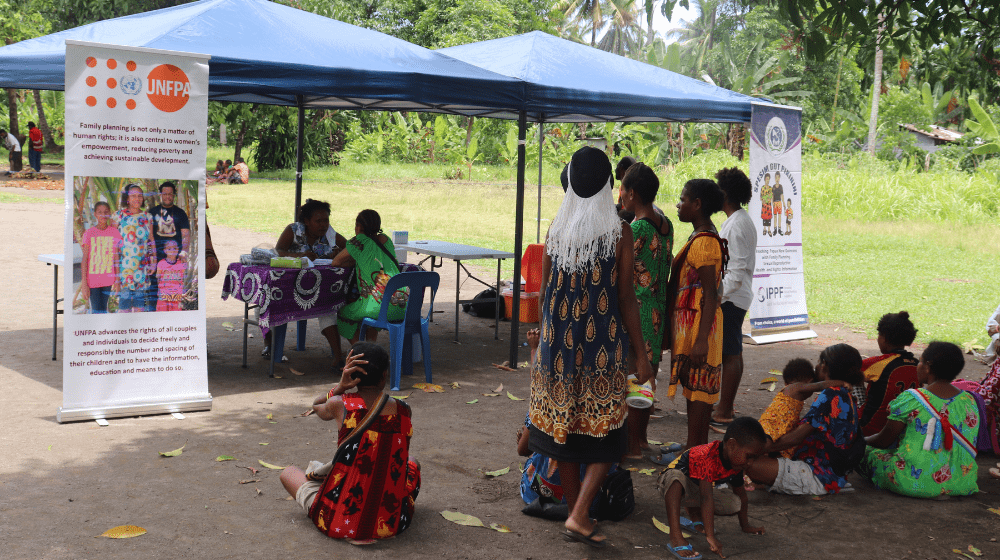In Papua New Guinea, remote communities face significant barriers in accessing essential life-saving services like information, healthcare, and sexual and reproductive health (SRH).
These challenges, compounded by high rates of gender-based violence (GBV), particularly impact young girls, leading to rising unintended pregnancies that jeopardize their futures and limit opportunities. GBV not only threatens individual safety and well-being but also weakens community structures, making access to education and health services even more difficult.
In the Poaba community in Lae, Morobe Province, early pregnancies are a leading cause of school dropouts among girls, reinforcing cycles of poverty. Local community chairman Elisha Saramo explains that most youth in Poaba complete only primary school, with young girls often entering the informal job market. “Early pregnancies are a major reason why many girls drop out of school,” Saramo notes. A lack of sexual health education leaves many young people uninformed about the consequences of unprotected sex and reproductive health risks.
To address these issues, the PNG Family Health Association (PNG FHA), supported by UNFPA and funded by the Korea International Cooperation Agency (KOICA), has been actively raising awareness on GBV and providing SRH services. While youth health initiatives are essential, integrating GBV support within healthcare services is lifesaving for vulnerable communities in Papua New Guinea, where survivor support remains critically needed.
Edwin Mawon, a Sexual and Gender-Based Violence (SGBV) officer and counselor, has worked on the frontlines of GBV intervention for four years. Initially a volunteer, Edwin has become a key figure in the community's support network for violence survivors. As a peer educator trained under the UNFPA-supported Y-Peer project, he focuses on GBV referral pathways and SRH services.
“The training has helped me improve the delivery of my work on sexual and reproductive health and rights," Edwin shares.
"SRH services are not easily accessible here, and some people feel ashamed to seek help. With the knowledge I’ve gained, I can reach more people in the community, educating them about their rights and how to access services.”
Beyond education, Edwin’s role includes identifying and referring GBV survivors to support services and offering psychosocial support.
“I receive about seven to eight survivors every month. I conduct psychosocial support sessions and make referrals to village and district courts, public solicitors, and family welfare offices,” Edwin explains. He refers them to local support networks, including community-based organizations (CBOs) and faith-based organizations (FBOs) like the Lutheran Church and City Mission in Lae.
Despite his dedication, Edwin acknowledges ongoing challenges. “There is a need for more specialized GBV training and formally trained counselors. Most survivors that I assist are domestic violence victims, and the shortage of specialized counselors is a major challenge.”
Gender dynamics further complicate the uptake of SRH and GBV services. Mavia Mumuan, a counselor and administrative officer at PNG Family Health Association in Lae, Morobe, notes that men often perceive SRH and GBV services as exclusively for women, creating a gap in male participation.
Wallace Ben, Chairman of Amalabo Estate in Lae, suggests that holding separate sessions for men and women encourages participation. “Tailoring services to local customs fosters open sharing and deeper engagement during counseling and support sessions,” Ben observes.
Through UNFPA-supported initiatives and partnerships with the Government of Papua New Guinea, healthcare providers are increasingly able to offer psychosocial support and targeted services to survivors of GBV and sorcery-related violence.
UNFPA partners with the PNG Family Health Association to ensure that women and girls facing, or at risk of, gender-based violence or violence related to sorcery accusations -- especially those in remote, underserved, and conflict or disaster-affected areas—have access to quality, timely, and well-coordinated multi-sectoral services.
The project currently active in Lae, Morobe Province, Goroka, Eastern Highlands Province, Simbu, Western Province and Mulitaka, Enga Province, aims to strengthen and expand access to life-saving services for survivors of GBV and Sorcery Accusations Related Violence as well as address gender and social norms that perpetuate violence in Papua New Guinea.


